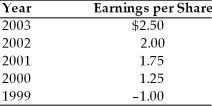Exam 14: Payout Policy
Exam 1: The Role of Managerial Finance133 Questions
Exam 2: The Financial Market Environment91 Questions
Exam 3: Financial Statements and Ratio Analysis209 Questions
Exam 4: Cash Flow and Financial Planning183 Questions
Exam 5: Time Value of Money173 Questions
Exam 6: Interest Rates and Bond Valuation224 Questions
Exam 7: Stock Valuation188 Questions
Exam 8: Risk and Return190 Questions
Exam 9: The Cost of Capital137 Questions
Exam 10: Capital Budgeting Techniques167 Questions
Exam 11: Capital Budgeting Cash Flows117 Questions
Exam 12: Risk and Refinements in Capital Budgeting106 Questions
Exam 13: Leverage and Capital Structure217 Questions
Exam 14: Payout Policy130 Questions
Exam 15: Working Capital and Current Assets Management340 Questions
Exam 16: Current Liabilities Management171 Questions
Exam 17: Hybrid and Derivative Securities185 Questions
Exam 18: Mergers, Lbos, Divestitures, and Business Failure191 Questions
Exam 19: International Managerial Finance108 Questions
Select questions type
Paying a stock dividend ________ the retained earnings account.
Free
(Multiple Choice)
4.9/5  (35)
(35)
Correct Answer:
A
The "treasury stock" is an accounting entry on the firm's balance sheet to designate the firm's total investment in government securities.
Free
(True/False)
4.9/5  (41)
(41)
Correct Answer:
False
Stock repurchases may be made for all of the following reasons EXCEPT
Free
(Multiple Choice)
4.8/5  (33)
(33)
Correct Answer:
D
Mr. R. owns 20,000 shares of ABC Corporation stock. The company is planning to issue a stock dividend. Before the dividend Mr. R. owned 10 percent of the outstanding stock, which had a market value of $200,000, or $10 per share. Upon receiving the 10 percent stock dividend the value of his shares is
(Multiple Choice)
4.9/5  (39)
(39)
The payment of cash dividends to corporate stockholders is decided by the
(Multiple Choice)
4.9/5  (33)
(33)
Tangshan Mining has 100,000 shares outstanding and just declared a 20% stock dividend. Before the announcement, the firm's shares were trading at $50.00 per share. After the stock dividend, the firm's shares should trade at ________ per share.
(Multiple Choice)
4.9/5  (34)
(34)
When purchasing outstanding shares of common stock a firm can utilize all of the following methods EXCEPT
(Multiple Choice)
4.9/5  (34)
(34)
Under the Jobs and Growth Tax Relief Reconciliation Act of 2003, the maximum rate of taxation on dividends received by shareholders was set at
(Multiple Choice)
4.8/5  (31)
(31)
A constant-payout-ratio dividend policy is a dividend policy based on the payment to existing owners of a dividend in the form of stock as a certain percentage of the firm's total number of stocks outstanding in each dividend period.
(True/False)
4.9/5  (35)
(35)
Because dividends are taxed at the same rate as capital gains under the 2003 Tax Act, a firm's strategy of paying low or no dividends primarily offers tax advantages to wealthy stockholders through tax deferral rather than as a result of a lower tax rate on current income.
(True/False)
4.8/5  (44)
(44)
By purchasing shares through a firm's dividend reinvestment plan (or DRIP), shareholders typically can acquire shares at a value that is above the prevailing market price.
(True/False)
5.0/5  (32)
(32)
A stock split commonly increases the number of shares outstanding and the stock's per share par value.
(True/False)
4.9/5  (35)
(35)
The repurchase of stock ________ the earnings per share and ________ the market price of stock.
(Multiple Choice)
4.9/5  (41)
(41)
A firm has had the following earnings history over the last five years:  If the firm's dividend policy was based on a constant payout ratio of 50 percent for all of the years with earnings over $1.50 per share and a zero payout otherwise, the annual dividends for 1999 and 2003 were
If the firm's dividend policy was based on a constant payout ratio of 50 percent for all of the years with earnings over $1.50 per share and a zero payout otherwise, the annual dividends for 1999 and 2003 were
(Multiple Choice)
4.8/5  (36)
(36)
The regular dividend policy provides the owners with generally positive information, indicating that the firm is okay and thereby minimizing their uncertainty.
(True/False)
4.8/5  (34)
(34)
A firm has the following stockholders' equity balances:  In states where the firm's legal capital is defined as the par value of its common stock, the maximum cash dividend the firm could pay is
In states where the firm's legal capital is defined as the par value of its common stock, the maximum cash dividend the firm could pay is
(Multiple Choice)
4.8/5  (36)
(36)
At a firm's quarterly dividend meeting held April 9, the directors declared a $0.50 per share cash dividend for the holders of record on Monday, May 1. The firm's stock will sell ex-dividends on
(Multiple Choice)
4.9/5  (41)
(41)
Showing 1 - 20 of 130
Filters
- Essay(0)
- Multiple Choice(0)
- Short Answer(0)
- True False(0)
- Matching(0)